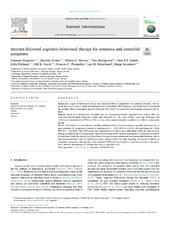| dc.contributor.author | Hagatun, Susanne | |
| dc.contributor.author | Vedaa, Øystein | |
| dc.contributor.author | Harvey, Allison G. | |
| dc.contributor.author | Nordgreen, Tine | |
| dc.contributor.author | Smith, Otto Robert Frans | |
| dc.contributor.author | Pallesen, Ståle | |
| dc.contributor.author | Havik, Odd E. | |
| dc.contributor.author | Thorndike, Frances P. | |
| dc.contributor.author | Ritterband, Lee M. | |
| dc.contributor.author | Sivertsen, Børge | |
| dc.date.accessioned | 2019-05-28T11:32:23Z | |
| dc.date.available | 2019-05-28T11:32:23Z | |
| dc.date.issued | 2018-06 | |
| dc.Published | Hagatun S, Vedaa Ø, Harvey AG, Nordgreen T, Smith ORF, Pallesen S, Havik OE, Thorndike, Ritterband, Sivertsen BS. Internet-delivered cognitive-behavioral therapy for insomnia and comorbid symptoms. Internet Interventions. 2018;12:11-15 | eng |
| dc.identifier.issn | 2214-7829 | |
| dc.identifier.uri | https://hdl.handle.net/1956/19765 | |
| dc.description.abstract | Background: Cognitive-behavioral therapy for insomnia (CBTi) is considered the standard treatment. The internet has proven to be a useful and successful tool of providing CBTi. However, few studies have investigated the possible effect of unguided internet-delivered CBTi (ICBTi) on comorbid psychological symptoms and fatigue. Methods: Based on a randomized controlled trial, we investigated whether unguided ICBTi had an effect on comorbid psychological symptoms. Adults with insomnia (n = 181; 67% women; mean age 44.9 years [SD 13.0]) were randomized to ICBTi (n = 95) or to an online patient education condition (n = 86) for a nine-week period. Results: The results from mixed linear modelling yielded medium to large between-group effect sizes from pre- to post-treatment for symptoms of anxiety or depression(d = −0.57; 95% CI = 0.79–0.35) and fatigue (d = 0.92; 95% CI = 1.22–0.62). The ICBTi group was reassessed at a 6-month non-randomized follow-up, and the completing participants had on the average a significant increase (from the post-assessment) on symptoms of anxiety or depression, while the reduction in symptoms of fatigue (on post-assessment) was maintained. However, due to high dropout attrition and no control group data, caution should be made regarding the long-term effects. In conclusion, the present findings show that unguided ICBTi positively influence comorbid symptoms in the short-term, thereby emphasizing the clinical relevance of unguided ICBTi. | en_US |
| dc.language.iso | eng | eng |
| dc.publisher | Elsevier | eng |
| dc.rights | Attribution CC BY-NC-ND | eng |
| dc.rights.uri | http://creativecommons.org/licenses/by-nc-nd/4.0/ | eng |
| dc.subject | Cognitive-behavioral therapy for insomnia | eng |
| dc.subject | Internet-based intervention | eng |
| dc.subject | Fatigue | eng |
| dc.subject | Depression | eng |
| dc.subject | Anxiety | eng |
| dc.title | Internet-delivered cognitive-behavioral therapy for insomnia and comorbid symptoms | eng |
| dc.type | Peer reviewed | |
| dc.type | Journal article | |
| dc.date.updated | 2019-01-16T12:27:38Z | |
| dc.description.version | publishedVersion | |
| dc.rights.holder | Copyright 2018 The Author(s) | eng |
| dc.identifier.doi | https://doi.org/10.1016/j.invent.2018.02.003 | |
| dc.identifier.cristin | 1588533 | |
| dc.source.journal | Internet Interventions | |
| dc.relation.project | Norges forskningsråd: 259293 | |

